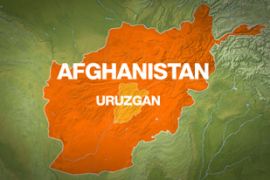Deadly blast hits Afghan market
Sixteen civilians, including children, and one police officer dead in explosion in Uruzgan.

“The terrorists today carried out a suicide attack in the bazaar of Dihrawud district of Uruzgan province as a result of which 16 civilians were killed and 13 others were wounded,” the office of President Hamid Karzai said in a statement.
In a separate attack in the neighbouring province of Helmand, one of the most violent regions in the country, a police officer was killed and five others were injured, Nato and Afghan authorities said.
UN report
There was no immediate claim of responsibility but both attacks bore the hallmarks of the Taliban, who are waging an intensifying insurgency to overthrow Karzai’s Western-backed government.
The attacks in Uruzagan and Helmand province also come a day after a report was released by the UN about the ongoing war in Afghanistan.
The report said that the number of Afghan civilians killed in war-related violence was at its highest level last year, noting a 40 per cent increase in civilian deaths in 2009 over the year before.
| in depth | |||||||
|
The report also said 67 per cent of the deaths were caused by Taliban attacks, while international troops and Afghan security forces were responsible for 25 per cent.
At least 113,000 international troops are in Afghanistan fighting the Taliban under US and Nato command, a figure set to rise to 150,000 by August.
Discussing the challenge of stabilising Afghanistan, Robert Grenier, a former CIA station chief in Pakistan who also headed the Iraq Issues Group during the Bush administration, told Al Jazeera: “I think for the short term, it might be too big. The centre of the conflict right now is the Pashtun-dominated areas in the south and east of the country.
“The US has given itself a fairly short timeline to make a difference there. The US, I think, is mistakenly relying too much on the central government. Afghanistan has never been characterised by strong central governance. We certainly cannot create strong central governance with a particular reliance on the [Afghan] army in the next 18 months.
“The real centres of power are in the localities and in the provinces. If the US is to have any hope – in the short or medium term – of making a difference there, of making sustainable gains, it is certainly going to be through partnerships with people who are willing to stand up to the Taliban at the provincial and local levels.
“There are no ideal solutions in the short and medium terms.”
